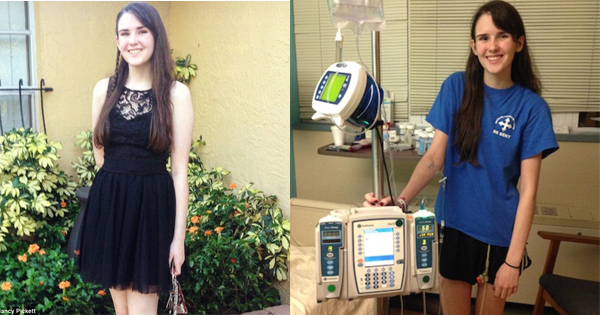17-year-old Nancy Pickett has been going through some hard times. At her young age, she was diagnosed with gastroparesis, a condition that causes her to be extremely malnourished, due to the fact that her body can’t properly digest food.
She’s suffered a lot with this illness, as gastroparesis causes vomiting, bloating, and abdominal pain, and leaves sufferers with no appetite and malnourishment.

“Often my nausea was so bad that I wished I could throw up—just to rid my stomach of the food sitting there—but I couldn’t,” Nancy told the Daily Mail.
But because her body couldn’t digest food properly, she lost weight without even trying or wanting to. She’d already been thin, but she dropped to 95 pounds.
“I’d lost enough weight to look like a supermodel. My thigh gap was huge, and all my bones were clearly visible,” said Nancy. “I must have felt gret about myself, right? I finally met society’s unattainable beauty standards!”
But this wasn’t glamorous for Nancy—she spent most of her days in the hospital, getting food infusions and barely able to walk. But her friends had a different take on it.
“You look like a supermodel,” her friends told her. Even those who knew she had a disease told her, “I wish I had your problem.”
“I wish that those people knew what it really felt like to be that skinny—weak, nauseous, isolated, unable to do what I loved. I wouldn’t wish this kind of malnutrition on anyone, but it’s promoted in the media daily.”

Her friends haven’t really been that understanding either. In addition to the weight loss, she also often has to miss school for hospital visits—it’s taken her a long time to make up all of the work. But her friends don’t see that part.
“A very small portion of my friends understand my diagnosis,” she says. “I actually still get those comments in regards to school absences and work schedules!”
But disease is not something to make fun of, and Nancy wants people to know that. She says she’s gained perspective on how unrealistic beauty standards are for women. She’s doing better now, thankfully, and with a feeding tube and physical therapy, she’ll be able to live a mostly normal life.





